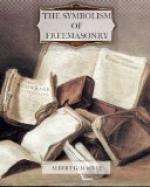And now we know by this symbolism what is meant by masonic labor, which, too, is itself but another form of the same symbol. The search for the Word—to find divine Truth—this, and this only, is a mason’s work, and the WORD is his reward.
Labor, said the old monks, is worship—laborare est orare; and thus in our lodges do we worship, working for the Word, working for the Truth, ever looking forward, casting no glance behind, but cheerily hoping for the consummation and the reward of our labor in the knowledge which is promised to him who plays no laggard’s part.
Goethe, himself a mason and a poet, knew and felt all this symbolism of a mason’s life and work, when he wrote that beautiful poem, which Carlyle has thus thrown into his own rough but impulsive language.
“The mason’s ways
are
A type of existence,—
And to his persistence
Is as the days are
Of men in this world.
“The future hides in
it
Gladness and sorrow;
We press still thorow,
Nought that abides in it
Daunting us—onward.
“And solemn before us
Veiled the dark portal,
Goal of all mortal;
Stars silent rest o’er
us
Graves under us silent.
“While earnest thou
gazest
Come boding of terror,
Comes phantasm and error,
Perplexing the bravest
With doubt and misgiving.
“But heard are the voices,
Heard are the sages,
The worlds and the ages;
’Choose well; your choice
is
Brief and yet endless.
“’Here eyes do
regard you,
In eternity’s stillness;
Here is all fullness,
Ye, brave to reward you;
Work and despair not.’”
* * * * *
And now, in concluding this work, so inadequate to the importance of the subjects that have been discussed, one deduction, at least, may be drawn from all that has been said.
In tracing the progress of Freemasonry, and in detailing its system of symbolism, it has been found to be so intimately connected with the history of philosophy, of religion, and of art, in all ages of the world, that the conviction at once forces itself upon the mind, that no mason can expect thoroughly to comprehend its nature, or to appreciate its character as a science, unless he shall devote himself, with some labor and assiduity, to this study of its system. That skill which consists in repeating, with fluency and precision, the ordinary lectures, in complying with all the ceremonial requisitions of the ritual, or the giving, with sufficient accuracy, the appointed modes of recognition, pertains only to the very rudiments of the masonic science.
But there is a far nobler series of doctrines with which Freemasonry is connected, and which it has been my object, in this work, to present in some imperfect way. It is these which constitute the science and the philosophy of Freemasonry, and it is these alone which will return the student who devotes himself to the task, a sevenfold reward for his labor.




